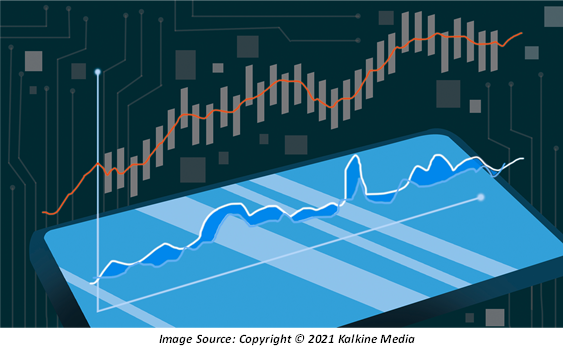What is the Random Walk Theory?
The random walk theory states that the movement in the stock prices is independent of each other. The theory is based on the assumption that the previous stock price or market trend and movement do not affect the future price movement. Chiefly, the theory proclaims that the price movement takes an unpredictable and random path, and all the practices which are adopted by the traders and investors are futile from the long-term perspective.
Summary
- The random walk theory states that the movement in the stock prices is independent of each other.
- The theory is based on the assumption that the previous stock price or market trend and movement do not affect the future price movement.
- The theory proclaims that the price movement takes an unpredictable and random path, and all the practices which are adopted by the traders and investors are futile from the long-term perspective.
Frequently Asked Questions (FAQs)
What is the working of the random walk theory?
The idea behind the random walk theory is that the attempts to find the pattern or predicting the future prices are futile. An investor or trader cannot take advantage of the market with the new information. The theory proclaims that the stock prices movement are independent of each other, that is, generally momentum does not exist, and past movement cannot predict the future movement. It is believed that there is a positive relationship between the price and events occurring in cluster or streaks. However, even the occurrence of streak events is also random.

The theory also claims that the methods and techniques used for the stock market prediction are completely futile. The theory has been supported by many academicians like Malkiel who stated that the future price is dependent upon subjective notions such as expected dividend pay-out, interest rate, estimated risk and expected growth rate.
The theory denies the application of technical analysis as the information gained by the analyst is already projected in the stock prices. Therefore, analysts cannot take advantage of the information generated. Moreover, widespread adoption of technical analysis results in no advantages to the users.
The fundamental analysis is also deemed as flawed, as the analysts collect and analyses useless information. There are innumerable factors that affect the stock prices, and the analyst are not able to make an accurate prediction.
Random walk theory has two forms, and both forms states that the investor cannot take advantage of rapid information incorporation. In the semi – strong market, the public information is already incorporated in the securities price and the investor cannot take full advantage of the same.
In a strong market, the analysts cannot take any advantage of the market as all the information, including the insider’s information is projected in the stock prices.
However, there are some exceptions in the random walk theory, that are –
- The less liquid stocks and whose prices are lower, have some correlation in the prices for the short term as new information is not incorporated into them easily.
- Seasonal trends exist in the stock market, generally during the beginning of the year and at the end of a week.
- High-dividend stocks show a pattern of higher returns over time as more and more investors turn to them during times of distress, increasing the demand for these stocks and hence, their prices.
What are the implications of the random walk theory?
The random walk theory states that the future market cannot be predicted, and investors cannot beat the market. Therefore, it is not possible for an investor or trader to outperform the market until the investor takes a huge amount of risk. In consideration of the theory, it is suggested that the investors should create a portfolio which resembles the stock market. The portfolio should reflect the market price movement.

Since the investors have been unable to outperform the market, it resulted in the creation of a lot of passive index funds. Moreover, a large number of investors believe in the wisdom of index investing.
What are the advantages of the random walk theory?
- The theory extends a cost - effective techniques of investing, such as investment in ETFs.
- Many cases indicated that the market does not perform as per the predictions of the analysts and the investors, and it proves the randomness of the stock prices and overall market.
What are the disadvantages of random walk theory?
- The securities market is not efficient entirely, so information asymmetry exists, and many investors take advantage of the information asymmetry and outperform the market.
- In many cases, repetition in the trends has been observed over the years.
- Lousy news can impact the stock market for several days and in some cases, the effect can be seen for months.
What is the criticism of random walk Theory?
The main criticism which is drawn by the random walk theory is that the market may follow a trend for a short time. This phenomenon takes place because the time invested by an investor or trader in a market is different. A savvy investor by strategically making the buying and selling decision can outperform the market.
One group of critics claimed that random walk theory is flawed as stock prices do follow a tend or pattern over a long run. The argument was supported by stating that the security prices are affected by large events or extreme factors. Therefore, it won’t be right to state that the market does not follow a pattern when an analyst cannot highlight the pattern.
What is the non - random walk theory?
The non-random walk theory assumes that traders with trading skills and superior market analysis can outperform the market average by a significant level.
It has been observed that few individual traders have been able to outperform the overall market consistently for a long period of time.
As per the random walk theory a person can outperform the market purely on a luck basis. However, it is not possible that the same person shows luck for years or months.
The random walk theory denied that the future price cannot be predicted, however, the technical analysis has the capability to predict the probable future price. The probability allows generating higher returns.
 Please wait processing your request...
Please wait processing your request...